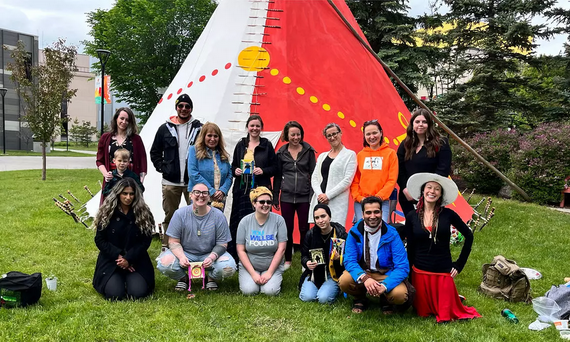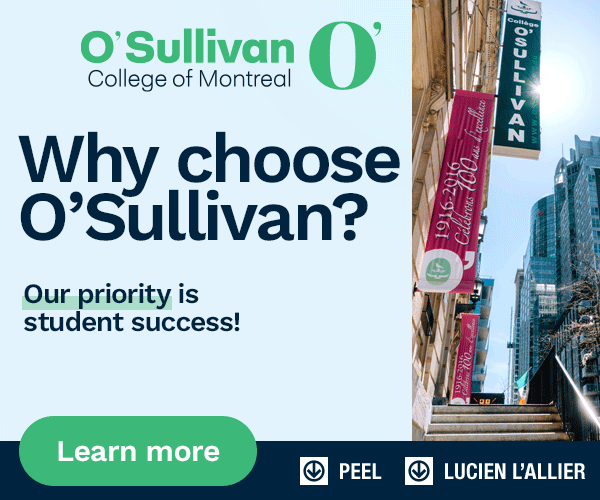
Students in UCalgary's International Indigenous Studies program learned about the land first-hand during the field course. Photo by Adela Kincaid
What does it mean to learn from the land? That's one of the questions taken up this year in INDG 312, the International Indigenous Studies program's Cultural Immersion Field Course.
INDG 312 was offered this spring term in partnership with Îyârhe-Nakoda community member Daryl Kootenay and co-ordinated by Dr. Adela Kincaid, PhD, assistant professor in the Faculty of Arts.
Kootenay says the importance of teaching in this way "is that it places Indigenous people in a position to practise, deliver, and create what is taught. It is fundamental so that Indigenous Peoples share what they want to share and teach what they want.
"By delivering the course in this way we are partially fulfilling and asserting our rights as Indigenous people under the United Nations Declaration on the Rights of Indigenous Peoples article #14 that upholds our rights to teach what we deem as appropriate to our cultural methods of teaching and learning."
Dr. Daniel Voth, PhD, who completed his term as INDG program director in June, sees the course as "an opportunity for students to learn in ways that centre people, land and relationships."
Voth, associate professor in the Faculty of Arts, says, "One of the things we've been doing in Indigenous studies is expanding our understanding of teachers and learners. We learn really interesting things in university classrooms, now we are also learning interesting and important lessons from the land with brilliant partners from Indigenous nations like Daryl. He's helping to tip the teaching/learning relationship on its head in wonderfully productive ways."
The course focuses on traditional teachings and practices that guide students through the preparation of a deer hide that is then used in the making of a parfleche. Kootenay presents students with an understanding of the Bow Valley from the Îyârhe-Nakoda perspective. The teachings include land-based learning, deep listening, learning by doing, and guided visualizations.
The course is rooted in ii' taa'poh'to'p by "Indigenous ways of knowing, and is sustained through traditions and protocols, ways of doing in practice by doing things in a good way,' ways of connecting via our connection to the land and with each other, and ways of being as the University of Calgary engages in institution-wide change to include Indigenous voice and cultural practices," says Elissa Twoyoungmen, Indigenous cultural education and protocol specialist from the Office of Indigenous Engagement.
The learning that happens in this course is a collaborative effort that practises Indigenous ways of connecting and relationship-building. The block week started in a good way when Elder Reg Crowshoe guided five tipi helpers to raise the tipi for the course. Twoyoungmen facilitated the creation of the space for our class and invited Siksika community members to help raise the tipi. It was so well done that it kept us warm and dry despite cool temperatures, rain, and strong winds
This year the course began with a pipe ceremony. A Knowledge Keeper, youth, and community members joined throughout the week to share strength-based approaches and to speak about community initiatives and their life journeys. Students had the opportunity to become immersed in song, self-reflections, scraping the hide and preparation techniques, followed by a guided vision exercise to create the design for their individual parfleches.
Students found the experience of learning in a tipi, from the land, and directly from Îyârhe-Nakoda community members to be a transformative experience. This was the last class for four students taking the course and they were honoured to complete their undergraduate degrees with this unique experience.
Kootenay created an environment where there were meaningful connections formed within a real sense of community. One example of a collaborative land-based group exercise, called "I notice, I am, We are," led to the creation of the following poetic story by students Marissa, Kate, Sara, Abishesh, and Andy, which was presented orally:
We are all stones in a circle
with raindrops darkening our surface
only to dry up leaving us
renewed underneath the way
tears streaming down our cheeks
leave us glowing once they dry
We are a wound creating a jewel
We are dandelion seeds
planted on earth to start our own journeys
We are in relation to the wind
We are the thistle
Dancing a geometry of spurs
The course will be offered again next spring in a block week format through the International Indigenous Studies program and supported by the Office of Indigenous Engagement. It is important to note that the course could not take place without funding for Indigenous community engagement from International Indigenous Studies, the Faculty of Arts, and the Office of Indigenous Engagement.
For more information on the course and how to enrol next spring, please email Dr. Adela Kincaid: atkincai@ucalgary.ca













